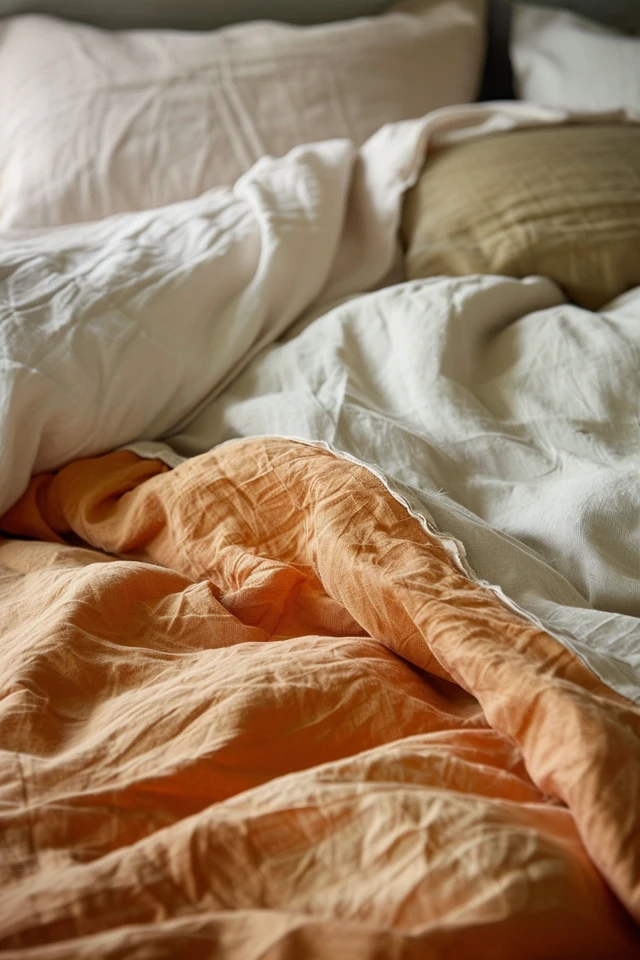Are you tired of your bed sheets looking worn and rough due to pilling? Those tiny balls of fuzz that form on the fabric can be frustrating, but there are ways to prevent them and keep your bedding comfortable for longer. In this article, I will share some bedding care tips to help you prevent pilling sheets and maintain the quality of your bedding.
Key Takeaways:
- Choose high-quality sheets made of materials like long-staple cotton or bamboo to reduce the likelihood of pilling.
- Wash your sheets correctly using mild detergents, gentle cycles, and cool or warm water to prevent pilling.
- Avoid overloading the washer and use lower heat settings when drying your sheets to minimize pilling.
- Store your sheets in a cool, dry place to prevent weakening and breaking of the fibers.
- Consider investing in sheets made of long-staple cotton, bamboo, TENCEL™ Lyocell, silk, or linen for increased durability and resistance to pilling.

How to Prevent Pilling from Bed Sheets
To ensure the longevity of your bed sheets and maintain their quality, it is crucial to implement effective anti-pilling techniques. By following these tips, you can prolong the lifespan of your sheets and enjoy comfortable bedding for years to come.
Choose High-Quality Sheets
Start by selecting bed sheets made of high-quality materials such as long-staple cotton or bamboo. These fabrics are known for their durability and resistance to pilling. Additionally, opt for sheets with a high thread count, as this indicates a tighter weave and less likelihood of pilling.
Wash Sheets Correctly
When it comes to washing your sheets, it’s important to use mild detergents and avoid harsh chemicals that can weaken the fabric. Opt for a gentle cycle with cool or warm water, as hot water can cause fibers to break down and contribute to pilling. Avoid overloading the washer to ensure proper agitation and prevent excessive friction.
Dry Sheets Properly
Proper drying techniques are essential in preventing pilling. Avoid high heat settings, as excessive heat can damage the fibers and lead to pilling. Instead, opt for lower heat or air-drying. Remove the sheets promptly from the dryer to prevent prolonged exposure to heat, which can further weaken the fibers.
Store Sheets Carefully
Storing your bed sheets in a cool, dry place is crucial in maintaining their quality and preventing pilling. Avoid storing them in direct sunlight or areas prone to moisture, as these conditions can weaken the fibers. Fold the sheets neatly and place them in a breathable fabric storage bag or drawer to protect them from dust and excess friction.
By implementing these anti-pilling techniques and maintaining proper bedding care, you can enjoy sheets that remain free from unsightly pilling, prolong their lifespan, and ensure a comfortable sleep experience.

Best Sheets to Avoid Pilling
While no sheets are completely pill-proof, certain materials are less likely to pill and have a longer lifespan.
Sheets made of long-staple cotton, such as Egyptian cotton or Pima cotton, are known for their durability and resistance to pilling.
Bamboo sheets, made from long fibers, are also less prone to pilling.
TENCEL™ Lyocell sheets offer durability, softness, and resistance to pilling, making them an excellent choice.
Silk sheets and linen sheets, while more expensive, are also less prone to pilling.
These materials, when properly cared for, can help maintain smooth and comfortable bedding.
Comparing Different Materials
When it comes to choosing the best sheets for durability and to prevent fabric pilling, it’s important to understand the characteristics of each material:
Long-staple cotton: Sheets made of long-staple cotton, such as Egyptian cotton or Pima cotton, are known for their strong fibers and resistance to pilling. They provide a smooth and breathable sleep experience.
Bamboo: Bamboo sheets are made from natural fibers that are strong, hypoallergenic, and moisture-wicking. They are resistant to pilling and offer a silky soft feel.
TENCEL™ Lyocell: TENCEL™ Lyocell sheets are made from sustainably sourced wood pulp and are known for their exceptional durability, moisture-wicking properties, and resistance to pilling. They provide a luxurious and eco-friendly bedding option.
Silk: Silk sheets are naturally hypoallergenic and temperature-regulating. They have a smooth and luxurious feel and are less prone to pilling.
Linen: Linen sheets are highly breathable, moisture-wicking, and durable. They become softer with each wash and are resistant to pilling.
When selecting sheets, consider your personal preferences and requirements for comfort, breathability, and maintenance.

Conclusion
Pilling is a common issue that can make your bed sheets look worn and rough, but with the right care and materials, you can prevent it and ensure comfortable and durable bedding. Washing your sheets correctly, drying them properly, and storing them in ideal conditions can significantly prolong their lifespan and maintain their quality.
Investing in high-quality sheets made of long-staple cotton, bamboo, TENCEL™ Lyocell, silk, or linen is also crucial in preventing pilling and ensuring a luxurious sleep experience. These materials are known for their durability and resistance to pilling, allowing you to enjoy smooth and comfortable bedding for a longer period.
Remember to follow the tips mentioned in this article, including choosing the right sheets, washing them correctly, and storing them properly. By taking these measures, you can maintain bedding quality and prevent pilling, ensuring that your bed sheets stay in excellent condition for years to come.

